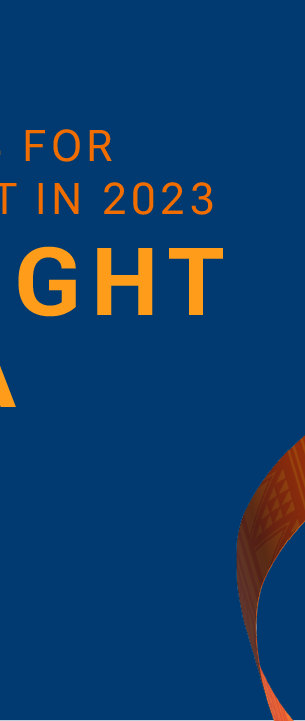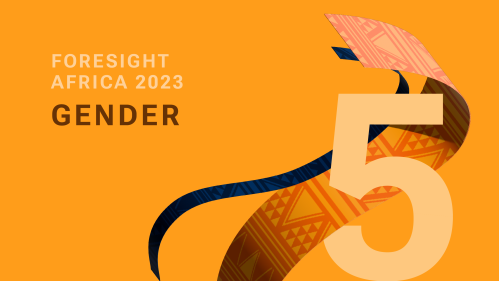Below is a viewpoint from the Foresight Africa 2023 report, which explores top priorities for the region in the coming year. Read the full chapter on gender.
 The COVID-19 pandemic has set African women and girls back significantly. They have lost jobs, education, and agency at a much higher rate than men during this crisis, and are too often left behind in plans for recovery.
The COVID-19 pandemic has set African women and girls back significantly. They have lost jobs, education, and agency at a much higher rate than men during this crisis, and are too often left behind in plans for recovery.
I joined the African Center for Economic Transformation (ACET) as executive vice president at the height of the pandemic, and one of my first priorities was to put gender equality squarely on Africa’s economic transformation and COVID recovery agendas. It is not enough to “mainstream” gender into policy—we have seen for years how little that has done to drive change at the pace necessary for transformation. According to the 2022 Global Gender Gap Index, sub-Saharan Africa has closed 67.8 percent of its gender gap (Figure 34). While this looks promising, most of the progress is due to a handful of countries that have taken positive steps towards economic inclusion, while the rest lag behind. Gender-responsive economic policies across the board are a must if we want to see stronger, more resilient, and more inclusive African economies.
The evidence of why gender equity is essential for development is incontrovertible and has been in the public sphere for decades. So, what is keeping us from turning this evidence into smart policies that will benefit entire economies and societies?
The evidence of why gender equity is essential for development is incontrovertible and has been in the public sphere for decades. So, what is keeping us from turning this evidence into smart policies that will benefit entire economies and societies?
This is the question guiding much of our work at ACET, and it comes down to power dynamics. History teaches us that unequal distribution of power affects the incentives and constraints that individuals, households, farms, and firms face. Many African policymakers overlook how existing power structures shape the economic institutions that support transformation—directly and indirectly—affecting both processes and outcomes. In families, gender influences how we perceive relationship dynamics. In workplaces, gender influences entry, compensation, and career progression. Women’s limited influence in economic and political decisionmaking is a stark reflection of this.
We have seen promising improvements across the African continent in terms of women’s representation in national decisionmaking. But much of this progress is driven by a few countries—Rwanda and South Africa, for example (Figure 33). As we dig deeper into the data, important disparities come to light. Ghana, for example, is at 145th/186 with just 14.6 percent representation of women in Parliament. Women make up only 22 percent of Cabinets in Africa, 7 percent of top executive positions (i.e., presidents, vice presidents) and manage only about 19 percent of government budgets on average.
This imbalance of power is also evident in the fight against COVID-19, where women make up only 20 percent of committees established to respond to the pandemic in 42 African countries.
We need a more equitable power balance to transform African economies quickly. Three actions can move us in the right direction. First, we must listen to and involve a diverse group of both women and men in every conversation—whether it has to do with macroeconomic policies or gender-based violence. With an enabling legal and institutional framework, Rwanda has managed to achieve this in various decisionmaking bodies including cabinet, parliament, district councils, and sector councils. For example Rwanda’s Organic Budget Law makes it mandatory for all ministries to include gender budget statements as part of the documentation submitted in the budget process. By placing a gender lens on budgeting in education, the country reached and sustained a gender parity index of one in secondary school enrollment between girls and boys. Second, we must implement the numerous policies and plans that already exist and we know can improve gender equality. When doing this we must recognize and seek out the diversity that co-exists within people (gender, race, ethnicity, disability status, etc.) and influence individual experiences—we cannot treat those that may fall into one common category as the same. Finally, we must create platforms so that countries can learn from each other on how best to make rapid and positive progress towards stronger gender equality.
At ACET, we have started our journey towards ensuring gender equality drives economic transformation on the continent and will be further exploring this in 2023 as we put together our next African Transformation Report (ATR). Given the importance of gender equality for economic transformation, the ATR will explore how Africa can best address the power dynamics that make it so difficult for Africa to close the gender gap for good.







Commentary
Equal power, faster progress: A recipe for Africa’s transformation
March 8, 2023